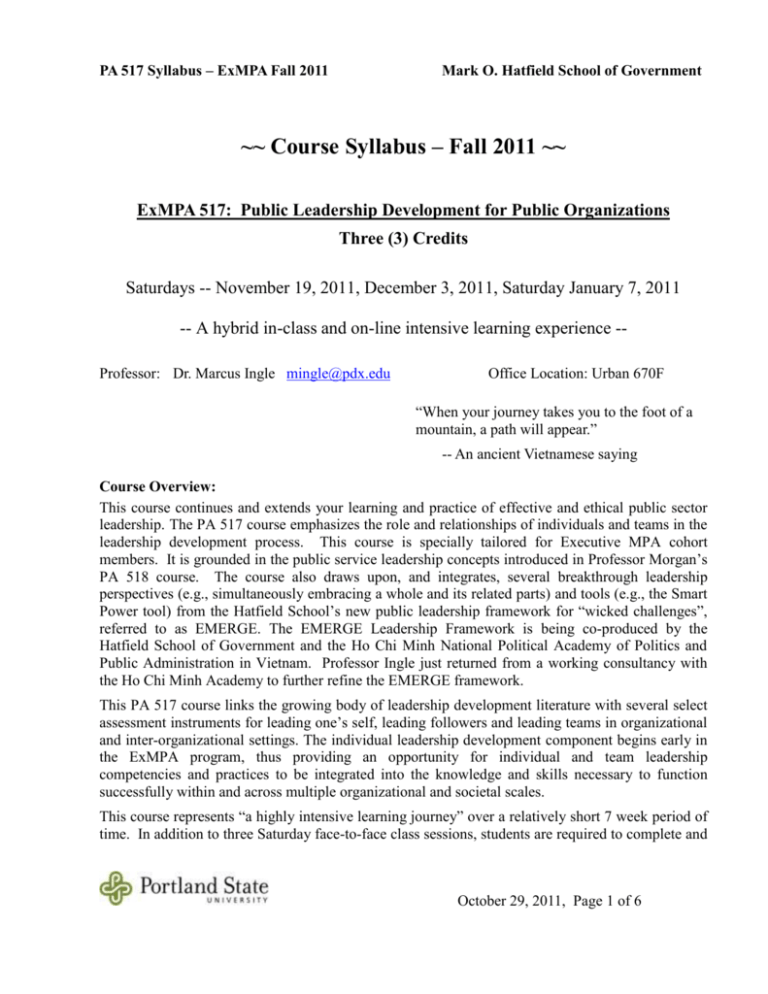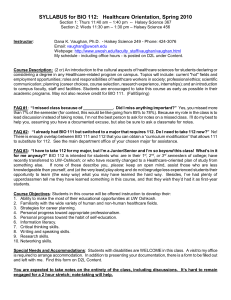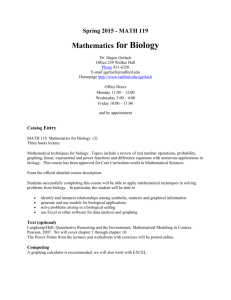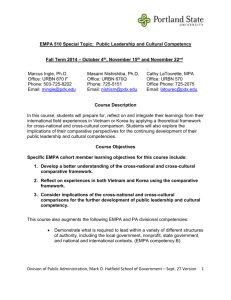PA 510 – Global Leadership and Management
advertisement

PA 517 Syllabus – ExMPA Fall 2011 Mark O. Hatfield School of Government ~~ Course Syllabus – Fall 2011 ~~ ExMPA 517: Public Leadership Development for Public Organizations Three (3) Credits Saturdays -- November 19, 2011, December 3, 2011, Saturday January 7, 2011 -- A hybrid in-class and on-line intensive learning experience -Professor: Dr. Marcus Ingle mingle@pdx.edu Office Location: Urban 670F “When your journey takes you to the foot of a mountain, a path will appear.” -- An ancient Vietnamese saying Course Overview: This course continues and extends your learning and practice of effective and ethical public sector leadership. The PA 517 course emphasizes the role and relationships of individuals and teams in the leadership development process. This course is specially tailored for Executive MPA cohort members. It is grounded in the public service leadership concepts introduced in Professor Morgan’s PA 518 course. The course also draws upon, and integrates, several breakthrough leadership perspectives (e.g., simultaneously embracing a whole and its related parts) and tools (e.g., the Smart Power tool) from the Hatfield School’s new public leadership framework for “wicked challenges”, referred to as EMERGE. The EMERGE Leadership Framework is being co-produced by the Hatfield School of Government and the Ho Chi Minh National Political Academy of Politics and Public Administration in Vietnam. Professor Ingle just returned from a working consultancy with the Ho Chi Minh Academy to further refine the EMERGE framework. This PA 517 course links the growing body of leadership development literature with several select assessment instruments for leading one’s self, leading followers and leading teams in organizational and inter-organizational settings. The individual leadership development component begins early in the ExMPA program, thus providing an opportunity for individual and team leadership competencies and practices to be integrated into the knowledge and skills necessary to function successfully within and across multiple organizational and societal scales. This course represents “a highly intensive learning journey” over a relatively short 7 week period of time. In addition to three Saturday face-to-face class sessions, students are required to complete and October 29, 2011, Page 1 of 6 PA 517 Syllabus – ExMPA Fall 2011 Mark O. Hatfield School of Government post assignments on D2L during the weeks with no in-class sessions (with the exception of the Christmas – New Year holiday break). Completing the readings, postings, critiques and related class preparations will require a high level of dedication and discipline by each student, and by the Professor. Course Objectives: The goal of the course is to assist ExMPA participants in understanding their individual leadership strengths and to further develop their capabilities to successfully lead at an individual and at team/group levels in the public sector – both in vertical systems of authority and in horizontal networked settings. More specifically, the course has three primary learning objectives for ExMPA cohort members: 1. To gain a deeper appreciation of public sector leadership development theory and practice in at the beginning of the second decade of the 21st century. 2. To become more self-aware of leadership strengths, public service values, emotional intelligence and applications of public leadership power. 3. To initiate the development a personalized leadership portfolio as a guide for further improvement of effective and ethical executive leadership competencies and practices. The course objectives address the following MPA, MPA-HA, MPH, ExMPA program competencies (drawn from the approved list of 10 standard competencies that all Executive MPA graduates are expected to master): 1. Articulate and exemplify the values, responsibilities and social roles as a member of the public service. 2. Identify and apply organizational, political, social and ethical frameworks to the practice of public service leadership, and management. 10. Think critically and self-reflectively about emerging issues concerning public service leadership, management and policy. To achieve the course objectives and acquire the intended competencies, the course will focus on: Leading one’s self, with an emphasis on self-assessment, leadership knowledge, and the development of a living individual leadership portfolio. Leading groups and teams with an emphasis on interpersonal and facilitative skills for resolving “wicked” public sector problems within and across public systems of action. Course participants will meet in several intense sessions over a several month period with assigned readings, D2L interactions, individual and team exercises, and academic writing assignments. Course Premises: 1. The course will follow the principle of “structured-flexibility”; that is, the course is carefully planned and organized with the expressed intent to modify the design as required to address special executive leadership requirements and additional issues as they arise. October 29, 2011, Page 2 of 6 PA 517 Syllabus – ExMPA Fall 2011 Mark O. Hatfield School of Government 2. Throughout the course, different ideas and positions will be discussed openly and candidly from a solid foundation of empirical evidence and public sector experience. 3. Students are viewed as the primary producers as well as consumers of course learning, so priority is given to careful preparation, active listening, interactive dialogue, and reflective practice. 4. The course will be viewed as one important step – neither the first nor the last – of acquiring the competencies and practices necessary for effective and ethical leadership in the public sector. Learning Approach The course will use the performance-learning approach which is based on a Confucian adage that: What I hear, I forget… What I see, I remember… What I do, I understand… It is recognized that ExMPA cohort members bring with them a rich background of life and public sector experience. This experience forms a valuable input to the learning process. Since this course aims at increasing both individual learning and leadership practice, each student will be expected to become fully engaged in assignments and exercises designed to accelerate competence and confidence. Mini lectures, team exercises, and case illustrations will be used throughout the course in order to enhance the mastery of leadership concepts and skills. Students are expected to take responsibility for their own learning throughout the course. The minimum requirements include: reading assigned and supplemental materials; actively participating in D2L assignments and all class sessions, and completing a high quality final leadership portfolio writing assignment. It is a fundamental premise of the course that adult learning involves hard work for students and the instructor, but that adult learning is also very enriching and can be lots of fun. Let’s try to do everything possible to enjoy the journey and laugh a lot along the way!! Course Schedule (Proposed): November 19th, Saturday (9:00 am to 5:00 pm) – Location TBD “Opening, Overview and Individual Leadership Profile” Leadership Icebreaker with Introductions and Expectations Overview of PA 517 including the Individual Leadership Profile Everyday Leadership Creativity and Values: Cohort Self-Assessment Emotional Intelligence: Concepts, Assessment Results and Application October 29, 2011, Page 3 of 6 PA 517 Syllabus – ExMPA Fall 2011 Mark O. Hatfield School of Government Look Ahead Learning Assignments December 3rd, Saturday (9:00am – 5:00pm) – Location TBD “Executive Leadership: Challenge and Pathways Forward” Strengths and Leadership: Assessment, Implications and Applications Leadership and Followership: What Followers Need for Engagement Learning Assignments (including Leadership Development Portfolio) January 7th, Saturday (9:00am to 5:00 pm) -- Location TBD “Public Leadership and Teams” Icebreaker with Team Leadership Role Play Leading Teams with Smart Power Final Course Writing Assignments Course Requirements: Session Preparation Each class session presupposes that ExMPA cohort members have carefully read the required assignments and arrive at class prepared to engage in active discussion and practice exercises. As we shall be learning and sharing together about questions that are sometimes elusive and almost always have more than one point of view, we shall have to cultivate our capabilities to read reflectively, to listen deeply, and to speak both descriptively and precisely. To aid you in this task, the instructor will provide a list of assigned course readings and study questions during the first Saturday class session. Students are required to upload their responses to the study questions into the web-based learning system (the “D2L” course management system) that will be used during this course. Each response should take the form of a one page, single-spaced narrative text with sources of information cited as References. Please type or paste your responses into the D2L text box so as to minimize the use of attachments. Reflect on and prepare your answers to the study questions with an eye to further exploring the assigned concepts and techniques in web-based interaction with other cohort members and the instructor, and during the day-long in-class sessions. Session Participation This course makes extensive use of a participatory approach referred to as performance learning. Since a major part of the learning from the course will be gained before and during the in-class performance-learning sessions, and since the learning will occur in a step-wise and cumulative October 29, 2011, Page 4 of 6 PA 517 Syllabus – ExMPA Fall 2011 Mark O. Hatfield School of Government manner from session to session, it is essential that enrolled ExMPA cohort members actively interact with each other between and during all class sessions. A substantial part of the grade for the course will be based upon the level of engagement and spirited learning. In between the class sessions, students should visit the D2L web-site frequently, both to interact with other students and to post supplemental course-related items of interest. The instructor will monitor the frequency and quality of D2L use, and participate in interactive discussions. Academic Writing Assignments In addition to weekly D2L postings and interactive sessions, the ExMPA cohort members will be required to complete two academic writing assignments: 1. The final hard copy version of each student’s “Executive Leadership Development Portfolio” is due at the beginning of class on January 7th. A template for the Leadership Development Portfolio is located in the Course Materials Folder of D2L for the November 19th session (Filename: Lead Devel Portfolio 2011). 2. An 8 to 10 page (double spaced) reflective leadership essay, plus references, is due on January 14th – a week following our last Saturday in-class session. This essay should focus on a public sector individual or team-related leadership topic. Professor Ingle will provide a list of optional topics on December 3rd during our second in-class session. The essay should draw on materials (books, articles, and postings) used during the course, and should include at least two additional academic references. The essays should be up-loaded into the Discussion Folder of D2L marked “Reflective Leadership Essays” before or on Janurary 14th. Grading the Learning: Because this course is being taken for academic credit, grading is required. To the extent possible, the grading will be based on the learning that occurs, and not on what is being taught. Several learning dimensions will be considered in determining each student’s final grade: 1. Session preparation will account for 35% of the grade. The learning from preparation will be measured by assessing the timeliness and quality of the D2L postings of answers to the study questions. Learning will also be measured by the frequency of D2L interaction with other students including the numbers of responses to other students, and creative postings of supplemental materials relevant to public sector leadership. The frequency of use of the D2L site -- including total usage, items downloaded, items posted and on-line interactions with others – will also be considered in determining the preparation grade. 2. Session Participation will account for 35% of the grade. Participation will be measured by student attendance during all sessions and by active engagement in individual and small group work as reflected in the quality of the products and in the participatory manner by which classroom tasks are approached and completed. October 29, 2011, Page 5 of 6 PA 517 Syllabus – ExMPA Fall 2011 Mark O. Hatfield School of Government 3. The Writing Assignments will account for the remaining 30% of the course grade. These assignments include both the Executive Leadership Development Portfolio and the Reflective Leadership Essay. Cohort members who complete the assigned readings, regularly interact with others using the D2L website, actively participate in all class sessions, and complete a high quality writing assignments should be able to master the leadership development content of this course at a high level of proficiency. Required Course Texts: Several texts are required for the course – all are provided as part of the ExMPA program: o Kouzes, James and Posner, Barry, 2007, The Leadership Challenge, Forth Edition, Jossey-Bass. (Selected Chapters in electronic form located in D2L Course Folder) o Nye, Joseph, 2008, The Powers to Lead, Oxford University Press. o Rath, Tom and Conchie, Barry, 2008, Strengths Based Leadership, Gallup Press. These readings will be supplemented by other articles and documents assigned throughout the course. During the first class session, the instructor will hand out (and post on the D2L system) a list of session-by-session reading and preparation assignments. Students who would like to get a head start on course readings should begin with Kouzes and Posner on-line reading materials in the Course Materials folder of D2L. Professor appointments: Prof. Ingle is generally available on campus throughout of the course. To arrange an appointment or address a course-related issues, please correspond with Prof. Ingle via the D2L “mail” feature. This allows the Professor to send responses to all members of the cohort if that is necessary. Dr. Marcus Ingle is a Professor of Public Administration and Director of International Public Service in the Executive Leadership Institute, Center for Public Service, Mark O. Hatfield School of Government at Portland State University. Dr. Ingle serves as the Principal Investigator for the Hatfield School’s innovative “Public Leadership for Sustainable Development” program in Oregon and Vietnam. He is Co-Principal Director of PSU’s China Urban Sustainability program in collaboration with the School of Urban Studies and Planning and the Ministry of Land and Resources in China. Dr. Ingle has extensive local, state, federal and international experience having directed the USAID Regional Infrastructure Program for Water and Sanitation in Budapest Hungary with Booz Allen & Hamilton. Prior to that Dr. Ingle served as the Project Director for the Vietnam Highways Improvement Project in Hanoi financed through the Asian Development Bank. Dr. Ingle is a specialist in capacity building for leadership and management including participatory and sustainability techniques. At PSU, Dr. Ingle teaches graduate courses in Executive Leadership, Strategic Management, Program and Project Management, Policy Implementation and Governance. Dr. Ingle formerly taught graduate seminars at the University of Maryland and at American University. Dr. Ingle holds a Masters of Public Administration from the University of Washington and a Ph.D. in Social Science from the Maxwell School of Public Affairs, Syracuse University. October 29, 2011, Page 6 of 6








